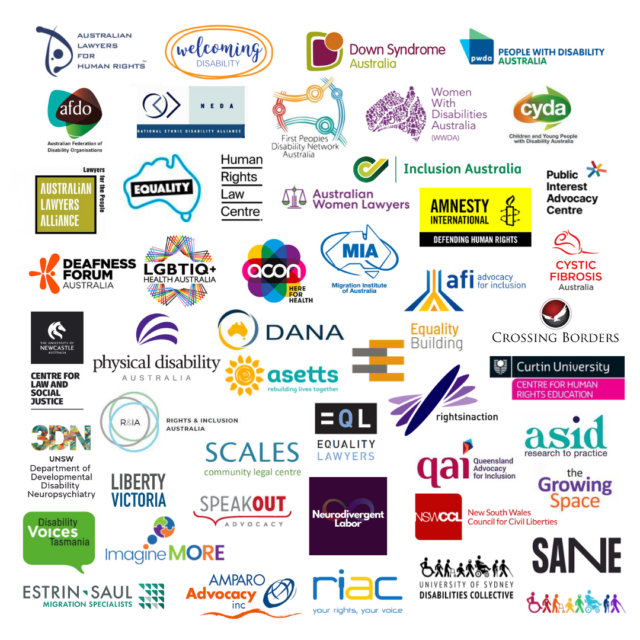
Civil Society calls for an end to discrimination against migrants with disabilities
More than 70 of Australia’s leading disability and civil society organisations have endorsed wide-ranging recommendations to reform the nation’s archaic and degrading migration laws.
The recommendations are part of a submission made by the Welcoming Disability Campaign to a public review of Australia’s migration health requirement being conducted by the Federal Government.
The recommendations call for an end to the Migration Act’s exemption from the Disability Discrimination Act and reforms to ensure that Australia’s approach complies with its legal obligations under core international human rights treaties.
Recommendations
Welcoming Disability recommends that the Federal Government:
Recommendation 1 – Implement Recommendation 4.32 of the 2023 Report of the Royal Commission into Violence, Abuse, Neglect and Exploitation of People with Disability and Recommendation 36(a) of the United Nations Committee on the Rights of Persons with Disabilities 2019 Concluding Observations to Australia by reviewing and removing:
- the exemption in the Disability Discrimination Act 1992 (Cth) to certain provisions of the Migration Act 1958 (Cth);
- Australia’s interpretative declaration to the Convention on the Rights of Persons with Disabilities;
- all forms of discrimination against people with disabilities and health conditions in Australia’s laws, formalities and procedures relating to migration and asylum in order to ensure compliance with Australia’s obligations under: the Convention on the Rights of Persons with Disabilities; the Convention on the Rights of the Child; and the remaining core United Nations human rights treaties to which Australia is a party.

Recommendation 2 – Immediately increase the unrealistic and internationally out of step Significant Cost Threshold (SCT) to a level that is at least commensurate with comparable democracies such as Canada and New Zealand.
Recommendation 3 – Reduce the assessed SCT time frame applied to permanent visa applicants from ten years to five years in line with the practice adopted in comparable democracies such as Canada and New Zealand.
Recommendation 4 – Formalise a definition of “significant cost” as a cost that exceeds the average costs of the Australian resident, as assessed by the Australian Institute of Health and Welfare (AIHW).
Recommendation 5 – Tie the SCT to AIHW figures in order to enable regular and automatic incremental adjustments to the level of the SCT and establish a fixed and transparent relationship between the combined annual per capita expenditure on health and welfare as published by the AIHW and the SCT, to align with the notion that a significant cost is necessarily greater than the average cost.
Recommendation 6 – Recognise that the right to education is a fundamental human right belonging to all children by immediately removing “special” education or supported education from Policy settings that include it as a community cost for the purposes of the MHR.
Recommendation 7 – Grant all children with disability or health conditions born in Australia to temporary residents an automatic waiver of the MHR.
Recommendation 8 – Implement the recommendations of the 2010 Enabling Australia Inquiry Report with particular regard to the Inquiry recommendations that were accepted within the Federal Government’s 2012 Response, but which remain unimplemented, including:
This submission was prepared by the Welcoming Disability Campaign.
The eight key recommendations within this submission are endorsed by the following organisations and experts:

- Australian Lawyers for Human Rights (ALHR)
- Down Syndrome Australia
- Australian Federation of Disability Organisations
- National Ethnic Disability Alliance (NEDA)
- People With Disability Australia
- Children and Young People with Disabilities Australia (CYDA)
- Women With Disabilities Australia
- Inclusion Australia
- LGBTIQ+ Health Australia
- ACON
- Amnesty International Australia
- Equality Australia
- Australian Women Lawyers Ltd.
- Disability Advocacy Network Australia (DANA)
- Advocacy for Inclusion
- Physical Disability Australia
- Rights and Inclusion Australia
- Human Rights Law Centre
- Centre for Human Rights Education, Curtin University
- Australian Lawyers Alliance
- Migration Institute of Australia
- Public Interest Advocacy Centre
- Neurodivergent Labor
- Association for Services to Torture and Trauma Survivors (ASeTTS)
- Centre for Law and Social Justice, Newcastle University
- Deafness Forum Australia
- Cystic Fibrosis Australia
- Australasian Society for Intellectual Disability
- New South Wales Council for Civil Liberties
- Liberty Victoria
- University of Sydney Disabilities Collective
- Equality Building
- Queensland Advocacy for Inclusion
- SCALES (Southern Communities Advocacy Legal & Education Service)
- AMPARO Advocacy
- Imagine More
- Disability Voices Tasmania
- RIAC (Rights Information Advocacy Centre)
- The Growing Space
- Speak Out Advocacy
- Rights In Action
- Kurdish Program on 3ZZZ Community Ethnic Radio
- SANE
- Crossing Borders
- Equality Lawyers
- Down Syndrome Victoria
- ACT Down Syndrome
- Down Syndrome Queensland
- Estrin Saul Lawyers
- Dr Jan Gothard, Migration law and policy expert
- The Hon Elizabeth Evatt AC
- Graeme Innes AM, Former Australian Disability Discrimination Commissioner
- Professor Adam Jaffe, UNSW Sydney
- Professor Julian Trollor, Acting Director, National Centre of Excellence in Intellectual Disability Health; Head of Department of Developmental Disability Neuropsychiatry; NHMRC Leadership Fellow, UNSW Medicine and Health, UNSW Sydney
- Kim Oates AO Emeritus Professor, Client Health, Sydney University
- Professor Christine Bigby, Director of the Living with Disability Research Centre, La Trobe University
- Professor Keith R. McVilly, University of Melbourne
- Cornelia Koch, Adelaide Law School
- Dr. Dinesh Palipana OAM
- Professor Susan Harris Rimmer, Griffith University
- Associate Professor Mary Anne Kenny, School of Law and Criminology, Murdoch University
- Dr Robin Banks, Post-Doctoral Fellow, Faculty of Law, University of Tasmania
- Michael Small, Director, Equality Building
- Helen Said
- Nathan Kennedy
- Professor Charlie Fox, UWA History Department
- Kathryn Viegas
- Min Guo
- Samantha Norman, RMA
- Jane Kenway, Emeritus Professor, Monash University, Professorial Fellow, Melbourne University
- Sarah Pettit, Associate Director Mapien
